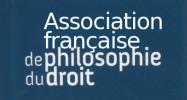Paper's abstract
Valentin
Petev,
Knowledge in Law and Aesthetic
Despite the growing sensibility our contemporary society tends to show towards art, the post-modern aesthetic theory does not worry anymore about determining the specific feature of the work of art. It rather analyses the institutional aspect of any artistic practice, which encloses, apart from the creators and receptors of art, the art critics, gallery owners and art sellers, patrons, directors of museums, etc. The artistic activity is an integral part of social reality. The knowledge of the work of art and the knowledge of the social reality through the work of art radiates into the various aesthetic discourses which are characterised by their pliability, the lack of theoretical and methodological dogmatism. The structures of the argumentation in the frame of the politico-juridical discourse and the decisions (norms) stemming from it, are totally apt for a pliable treatment, after the fashion of the paradigms already established by the aesthetic experience. This experience could bring the politico-juridical discourse to fall into line with and conform to the practices and social aspirations always on the move.
Key Words : post-modern aesthetic theory, dogmatism, discourse, argumentation
t. 40, 1995 : p. 96-105
